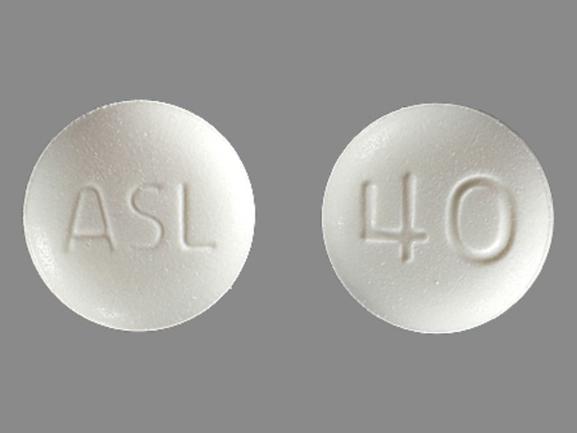Edarbi Side Effects
Generic name: azilsartan medoxomil
Medically reviewed by Drugs.com. Last updated on Aug 17, 2024.
Note: This document provides detailed information about Edarbi Side Effects associated with azilsartan medoxomil. Some dosage forms listed on this page may not apply specifically to the brand name Edarbi.
Applies to azilsartan medoxomil: oral tablet.
Important warnings
This medicine can cause some serious health issues
Oral route (tablet)
Discontinue use of azilsartan medoxomil as quickly as possible if pregnancy is detected as drugs that act directly on the renin-angiotensin system can cause injury and death to the developing fetus.
Precautions
It is very important that your doctor check your progress at regular visits to make sure this medicine is working properly. Blood tests may be needed to check for unwanted effects.
Using this medicine while you are pregnant can harm your unborn baby. Use an effective form of birth control to keep from getting pregnant. If you think you have become pregnant while using this medicine, tell your doctor right away.
Dizziness, lightheadedness, or fainting may occur, especially when you get up from a lying or sitting position or if you have been taking a diuretic (water pill). Make sure you know how you react to this medicine before you drive, use machines, or do anything else that could be dangerous if you are dizzy or not alert. If you feel dizzy, lie down so you do not faint. Then sit for a few moments before standing to prevent the dizziness from returning. If you faint, call your doctor right away.
Check with your doctor right away if you become sick while taking this medicine, especially with severe or continuing nausea, vomiting, or diarrhea. These conditions may cause you to lose too much water and may lead to low blood pressure. You can also lose water by sweating, so drink plenty of water during exercise or in hot weather.
Do not take other medicines unless they have been discussed with your doctor. This especially includes nonprescription medicines for appetite control, asthma, colds, cough, hay fever, or sinus problems, since they may tend to increase your blood pressure.
Common side effects of Edarbi
Some side effects of azilsartan medoxomil may occur that usually do not need medical attention. These side effects may go away during treatment as your body adjusts to the medicine. Also, your health care professional may be able to tell you about ways to prevent or reduce some of these side effects.
Check with your health care professional if any of the following side effects continue or are bothersome or if you have any questions about them:
Less common side effects
- diarrhea
Rare side effects
- cough
- dizziness
- lack or loss of strength
- muscle spasm
- nausea
Serious side effects of Edarbi
Along with its needed effects, azilsartan medoxomil (the active ingredient contained in Edarbi) may cause some unwanted effects. Although not all of these side effects may occur, if they do occur they may need medical attention.
Check with your doctor immediately if any of the following side effects occur while taking azilsartan medoxomil:
Rare side effects
- blurred vision
- confusion
- dizziness, faintness, or lightheadedness when getting up suddenly from a lying or sitting position
- sweating
- unusual tiredness or weakness
See also:
For healthcare professionals
Applies to azilsartan medoxomil: oral tablet.
General adverse events
The most common side effects were diarrhea, dizziness, headache, dyslipidemia, cough, and increased blood creatine phosphokinase.[Ref]
Gastrointestinal
- Common (1% to 10%): Diarrhea
- Uncommon (0.1% to 1%): Nausea[Ref]
Nervous system
- Common (1% to 10%): Dizziness, headache
- Frequency not reported: Dizziness postural[Ref]
Metabolic
- Common (1% to 10%): Dyslipidemia
- Uncommon (0.1% to 1%): Blood uric acid increased, hyperuricemia[Ref]
Respiratory
- Common (1% to 10%): Cough[Ref]
Musculoskeletal
- Common (1% to 10%): Blood creatine phosphokinase increased
- Uncommon (0.1% to 1%): Muscle spasm[Ref]
Dermatologic
- Uncommon (0.1% to 1%): Rash, pruritus
- Rare (less than 0.1%): Angioedema[Ref]
Other
Hematologic
- Uncommon (0.1% to 1%): Low hemoglobin, low hematocrit, low RBC counts[Ref]
Renal
- Uncommon (0.1% to 1%): Blood creatinine increased[Ref]
Cardiovascular
- Uncommon (0.1% to 1%): Hypotension[Ref]
References
1. Cerner Multum, Inc. "UK Summary of Product Characteristics."
2. (2011) "Product Information. Edarbi (azilsartan)." Takeda Pharmaceuticals America
More about Edarbi (azilsartan medoxomil)
- Check interactions
- Compare alternatives
- Pricing & coupons
- Reviews (45)
- Drug images
- Dosage information
- During pregnancy
- FDA approval history
- Drug class: angiotensin receptor blockers
- Breastfeeding
- En español
Patient resources
Professional resources
Related treatment guides
Further information
Edarbi side effects can vary depending on the individual. Always consult your healthcare provider to ensure the information displayed on this page applies to your personal circumstances.
Note: Medication side effects may be underreported. If you are experiencing side effects that are not listed, submit a report to the FDA by following this guide.

